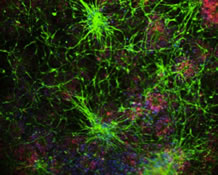Columbia University
Irving Medical Center
Neurological Institute
710 West 168th Street, 3rd floor
(212) 305-1818
About Us
Taub Faculty
Scott A. Small MD is the Director of the Alzheimer's Disease Research Center at Columbia University, where he is the Boris and Rose Katz Professor of Neurology. He is appointed in the Departments of Neurology, Radiology, and Psychiatry.
With an expertise in Alzheimer's disease and cognitive aging, Dr. Small's research focuses on the hippocampus, a circuit in the brain targeted by these and other disorders, notably schizophrenia. He has pioneered the development and application of high-resolution functional MRI techniques that can pinpoint parts of the hippocampus most affected by aging and disease. His lab then uses this information to try to identify causes of these disorders. Over the years, his lab has used this 'top-down' approach to isolate pathogenic mechanisms related to Alzheimer's disease, cognitive aging, and schizophrenia. More recently, his lab has used this insight for drug discovery and to develop novel therapeutic interventions, some of which are currently being tested in patients.
Dr. Small has co-authored over 120 articles and his neuroimaging and molecular work has led to 7 patents. Dr. Small is the recipient of numerous awards, including the Beeson Scholar Award in Aging Research from the American Federation on Aging, the McKnight Neuroscience of Brain Disorders Award, the Derek Denny-Brown Young Neurological Scholar Award from the American Neurological Association, and the Lamport Award for Excellence in Clinical Science Research from Columbia University.
With an expertise in Alzheimer's disease and cognitive aging, Dr. Small's research focuses on the hippocampus, a circuit in the brain targeted by these and other disorders, notably schizophrenia. He has pioneered the development and application of high-resolution functional MRI techniques that can pinpoint parts of the hippocampus most affected by aging and disease. His lab then uses this information to try to identify causes of these disorders. Over the years, his lab has used this 'top-down' approach to isolate pathogenic mechanisms related to Alzheimer's disease, cognitive aging, and schizophrenia. More recently, his lab has used this insight for drug discovery and to develop novel therapeutic interventions, some of which are currently being tested in patients.
Dr. Small has co-authored over 120 articles and his neuroimaging and molecular work has led to 7 patents. Dr. Small is the recipient of numerous awards, including the Beeson Scholar Award in Aging Research from the American Federation on Aging, the McKnight Neuroscience of Brain Disorders Award, the Derek Denny-Brown Young Neurological Scholar Award from the American Neurological Association, and the Lamport Award for Excellence in Clinical Science Research from Columbia University.


